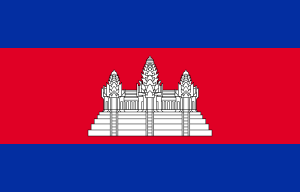Language/Central-khmer/Grammar/Personal-Pronouns
| ◀️ Telling Time — Previous Lesson | Next Lesson — Possessive Pronouns ▶️ |
Introduction[edit | edit source]
Welcome to the lesson on Central Khmer personal pronouns! In this lesson, we will explore the different types of personal pronouns used in Central Khmer, including subject pronouns and object pronouns. Understanding and correctly using personal pronouns is essential for effective communication in any language, and Central Khmer is no exception. By the end of this lesson, you will have a solid grasp of the Central Khmer personal pronouns and be able to use them confidently in your conversations.
Subject Pronouns[edit | edit source]
Subject pronouns are used to replace the subject of a sentence. They allow us to avoid repetition and make our speech more concise. In Central Khmer, subject pronouns are placed before the verb. Let's take a look at the Central Khmer subject pronouns:
| Central Khmer | Pronunciation | English |
|---|---|---|
| ខ្ញុំ (khnhom) | khnhom | I, me |
| អ្នក (nak) | nak | you |
| គាត់ (kaat) | kaat | he, she, it |
| យើង (yerng) | yerng | we, us |
| អ្នកយើង (nak yerng) | nak yerng | you (plural) |
| ពួកយើង (pouk yerng) | pouk yerng | they |
Let's see these subject pronouns in action with some examples:
- ខ្ញុំកៅសុីនេះ។ (khnhom kav soneh) - I am a teacher.
- អ្នកមានអ្នកក្រុមហ៊ុនដែលធ្វើការជាច្រើន។ (nak mean nak kromhun del thvey kar chhaer) - You have a team that does a lot of work.
- គាត់មានអំពើហិង្សានៅពីរ។ (kaat mean ompoeh heing snaeh pi) - He/She has two siblings.
- យើងកំពុងរៀនភាសាខ្មែរ។ (yerng kompung riin pheasa khmae) - We are learning Central Khmer.
- អ្នកយើងទើបកំពុងធ្វើការណាស់។ (nak yerng tvea kompung thvey kar neah) - You (plural) are busy working.
- ពួកយើងកំពុងអនុវត្ត។ (pouk yerng kompung ongavot) - They are resting.
Object Pronouns[edit | edit source]
Object pronouns, as the name suggests, are used to replace the object of a sentence. They are placed after the verb. Let's take a look at the Central Khmer object pronouns:
| Central Khmer | Pronunciation | English |
|---|---|---|
| ខ្ញុំ (khnhom) | khnhom | me |
| អ្នក (nak) | nak | you |
| គាត់ (kaat) | kaat | him, her, it |
| យើង (yerng) | yerng | us |
| អ្នកយើង (nak yerng) | nak yerng | you (plural) |
| ពួកយើង (pouk yerng) | pouk yerng | them |
Let's see these object pronouns in action with some examples:
- ខ្ញុំនិងមិត្តភាពរបស់ខ្ញុំលើកទឹក។ (khnhom nung mittapheap robsa khnhom loek teuk) - He/She understands my feelings about water.
- អ្នកស្រីរបស់អ្នកជាកូនប្រុស។ (nak srei robsa nak chha kon pros) - You have a brother.
- គាត់មានអំពើនៅលើការអភិវឌ្ឍន៍។ (kaat mean ompoeh neah loek kar ahpiveaden) - He/She has an opinion on the matter.
- យើងរកឃើញពិន្ទុរបស់យើង។ (yerng rok khunh paen robsa yerng) - We found our tickets.
- អ្នកយើងឃើញពិន្ទុរបស់អ្នក។ (nak yerng khunh paen robsa nak) - You (plural) saw your tickets.
- ពួកយើងទើបឃើញពិន្ទុរបស់ពួកយើង។ (pouk yerng tvea khunh paen robsa pouk yerng) - They just saw their tickets.
Cultural Insights[edit | edit source]
In Central Khmer culture, the use of personal pronouns carries significant weight in social interactions. Addressing someone by their appropriate pronoun is a sign of respect and politeness. It is common for Central Khmer speakers to use kinship terms instead of personal pronouns in certain situations. For example, older people may be referred to as "grandfather" or "grandmother" instead of using the pronoun "you." This reflects the cultural emphasis on hierarchy and respect for elders.
Additionally, Central Khmer culture places great importance on maintaining harmony and avoiding conflict. The use of pronouns can reflect this cultural value. It is common for Central Khmer speakers to avoid using first-person pronouns excessively, as it can be seen as self-centered or boastful. Instead, they may use alternative constructions or omit pronouns altogether to focus on the collective rather than the individual.
Practice Exercises[edit | edit source]
Now it's time to practice using Central Khmer personal pronouns! Try to complete the following exercises by choosing the correct pronoun for each sentence. The solutions will be provided after the exercises, so you can check your answers.
Exercise 1: Choose the correct personal pronoun.
1. __ទើបកំពុងមើលអ្នក។ (tvea kompung meul nak)__ - We are looking at you. 2. __គាត់មានស៊ីវ៉ារបស់គាត់។ (kaat mean sivya robsa kaat)__ - He/She has his/her own opinion. 3. __អ្នកបានទទួលបានតម្លៃពីខ្ញុំ។ (nak banh turtal banh tamleav pi khnhom)__ - You received a gift from me. 4. __យើងឃើញគ្រាប់ច្រើនគ្នា។ (yerng khunh krap chhaer khneah)__ - We see each other often. 5. __ខ្ញុំមានកូនប្រុស។ (khnhom mean kon pros)__ - I have a son.
Exercise 2: Rewrite the following sentences using object pronouns.
1. អ្នកស្រីនិងមិត្តភាពរបស់អ្នកលើកទឹក។ 2. អ្នកនិងស្មារតីមានសុខភាពល្អ។ 3. យើងរកឃើញការងាររបស់យើង។ 4. អ្នកស្រីឃើញពិន្ទុរបស់អ្នក។ 5. ពួកអ្នកយើងឃើញកំពុងទទួលការណ៍។
Solutions[edit | edit source]
Exercise 1:
1. យើងកំពុងមើលអ្នក។ (yerng kompung meul nak) - We are looking at you. 2. គាត់មានស៊ីវ៉ារបស់គាត់។ (kaat mean sivya robsa kaat) - He/She has his/her own opinion. 3. ខ្ញុំបានទទួលបានតម្លៃពីអ្នក។ (khnhom banh turtal banh tamleav pi nak) - I received a gift from you. 4. យើងឃើញគ្រាប់ច្រើនគ្នា។ (yerng khunh krap chhaer khneah) - We see each other often. 5. ខ្ញុំមានកូនប្រុស។ (khnhom mean kon pros) - I have a son.
Exercise 2:
1. អ្នកស្រីនិងមិត្តភាពរបស់អ្នកលើកទឹក។ (nak srei nung mittapheap robsa nak loek teuk) - You and your sister understand each other about water. 2. អ្នកនិងស្មារតីមានសុខភាពល្អ។ (nak nung smatay mean sokhapheap loy) - You and your friend have good health. 3. យើងរកឃើញការងាររបស់យើង។ (yerng rok khunh krap kar ngear robsa yerng) - We found our work. 4. អ្នកស្រីឃើញពិន្ទុរបស់អ្នក។ (nak srei khneah paen robsa nak) - You saw your sister's ticket. 5. ពួកអ្នកយើងឃើញកំពុងទទួលការណ៍។ (pouk nak yerng khneah kompung turtal kar neah) - They saw your group receiving the news.
Sources[edit | edit source]
Other Lessons[edit | edit source]
- Gender
- 0 to A1 Course
- Conditional Mood
- Questions
- Present Tense
- Describing Actions and States
- How to Use Have
- Pronouns
- How to Use Be
| ◀️ Telling Time — Previous Lesson | Next Lesson — Possessive Pronouns ▶️ |

